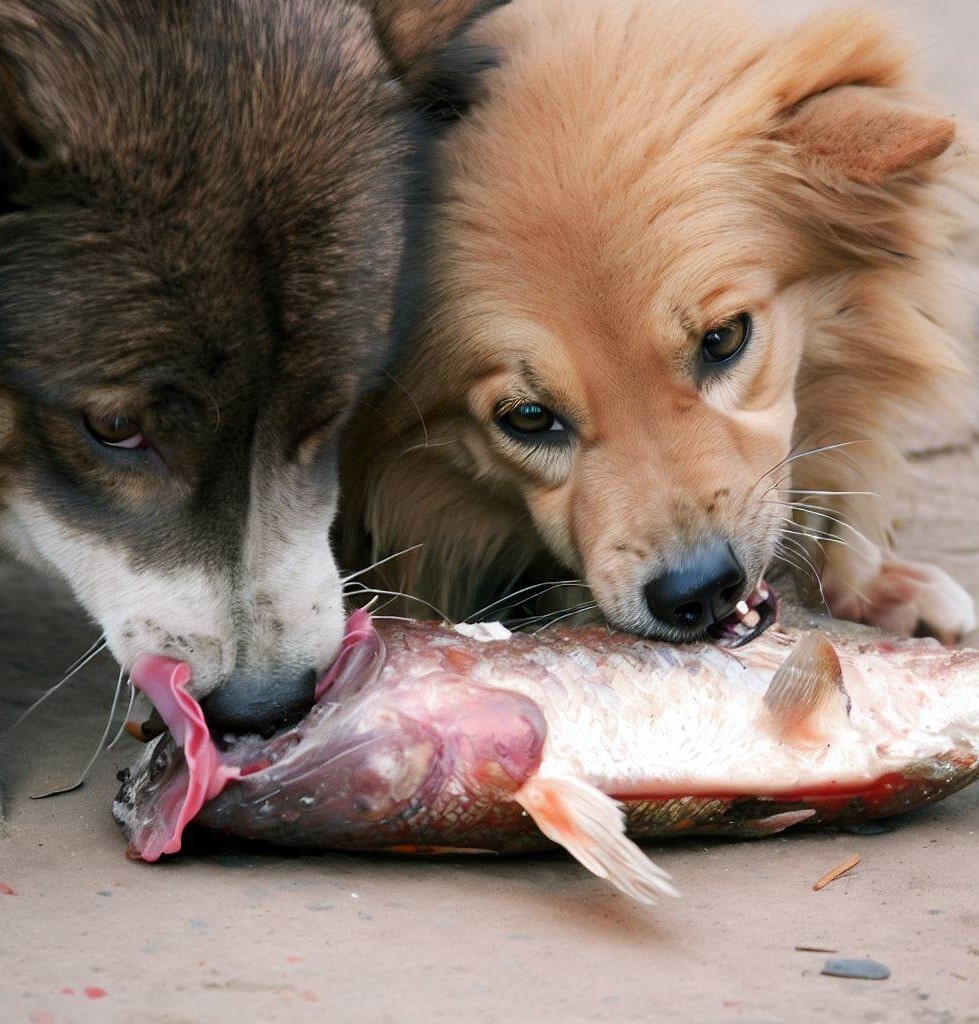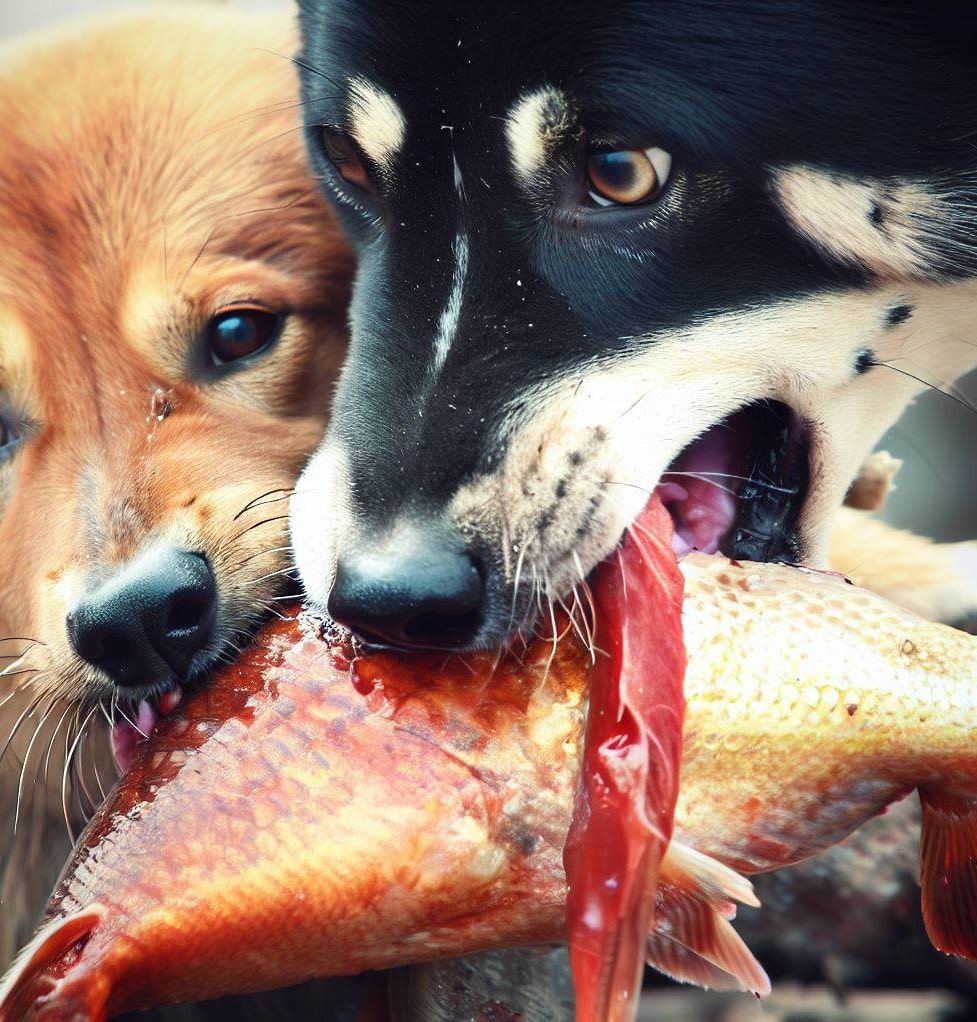If you’re a pet owner, you may have wondered if it’s safe for dogs to eat catfish. After all, fish is often touted as a healthy food for dogs, and catfish is a common type of fish found in many parts of the world. In this blog post, we’ll explore whether dogs can eat catfish and the potential benefits and risks associated with feeding it to your furry friend.
Table of Contents
Can Dogs Eat Catfish?
The short answer is yes; dogs can eat catfish. In fact, many commercial dog foods contain fish as a primary ingredient, including catfish. This is because fish is a good source of protein, healthy fats, and essential nutrients that dogs need to thrive.

Benefits Of Feeding Catfish To Dogs
As we mentioned earlier, catfish is a good source of protein and omega-3 fatty acids, which offer a range of health benefits for dogs. Here are some potential benefits of feeding catfish to your furry friend:
- Healthy skin and coat: The omega-3 fatty acids found in catfish can help improve your dog’s skin and coat health by reducing inflammation, promoting hydration, and increasing skin elasticity.
- Improved joint health: Omega-3 fatty acids can also help reduce joint inflammation and pain, making it a good option for dogs with arthritis or other joint issues.
- Stronger immune system: The nutrients in catfish, including vitamins A, B12, and D, as well as minerals like selenium and zinc, can help support your dog’s immune system and keep them healthy.
- Enhanced brain function: Omega-3 fatty acids have been shown to improve cognitive function and memory in dogs, making catfish a good choice for older dogs or those with cognitive dysfunction.
Risks Of Feeding Catfish To Dogs
While catfish can offer several health benefits for dogs, some potential risks are associated with feeding it to your furry friend. Here are some things to keep in mind:
- Bones: Catfish bones can be a choking hazard for dogs, especially small or toy breeds. Always make sure to remove any bones before feeding catfish to your dog.
- Parasites: Like all types of fish, catfish can contain parasites that may be harmful to dogs. To minimize the risk of infection, make sure to cook the fish thoroughly before feeding it to your dog.
- Allergies: Some dogs may be allergic to fish, including catfish. If your dog has never eaten fish before, it’s a good idea to introduce it slowly and monitor them for any signs of an allergic reaction.
- Mercury: Like other types of fish, catfish can contain high amounts of mercury, which can be toxic to dogs. To minimize the risk of mercury poisoning, it’s important to feed your dog fish in moderation and choose low-mercury options whenever possible.
How To Feed Catfish To Dogs?
Feeding catfish to dogs can be a healthy and nutritious addition to their diet if done correctly. Here are some tips for feeding catfish to dogs:
- Choose high-quality, fresh catfish that is free from any contaminants or additives.
- Thoroughly cook the catfish to an internal temperature of at least 145°F to kill any harmful bacteria or parasites that may be present.
- Serve the catfish boneless to avoid choking hazards or damage to your dog’s digestive tract.
- Avoid adding seasonings or spices to the catfish, as some ingredients can harm dogs.
- Introduce new foods to your dog’s diet slowly and in small amounts to avoid any digestive upset.
- Monitor your dog for any signs of an allergic reaction or other adverse effects after feeding them catfish.
- Consult with your veterinarian before making any changes to your dog’s diet to ensure that they are getting all the essential nutrients they need to stay healthy.
By following these guidelines, you can safely and effectively feed catfish to your dog and provide them with a healthy and nutritious source of protein and essential nutrients.
Read More: Can Dogs Eat Caramel Popcorn?
FAQs

Is it safe for dogs to eat catfish?
Yes, it is generally safe for dogs to eat catfish as long as it is cooked thoroughly and served boneless.
Can dogs eat raw catfish?
It is not recommended to feed dogs raw catfish, as it may contain harmful bacteria and parasites that can make them sick.
How should catfish be prepared for dogs?
Catfish should be cooked thoroughly and served boneless to ensure that dogs are safe to eat. It is also important to avoid adding any seasonings or spices that may be harmful to dogs.
Can dogs eat fried catfish?
Fried catfish is not recommended for dogs, as it may be high in fat and unhealthy additives. Sticking to plain, cooked catfish without any added ingredients is best.
What are the nutritional benefits of catfish for dogs?
Catfish is a good source of protein, omega-3 fatty acids, and essential nutrients like vitamins and minerals that can support your dog’s overall health and wellbeing.
Can dogs be allergic to catfish?
Yes, some dogs may be allergic to catfish or other types of fish. If your dog has never eaten fish before, it’s best to introduce it slowly and monitor them for any signs of an allergic reaction.
What are the potential risks of feeding catfish to dogs?
Some potential risks of feeding catfish to dogs include the presence of bones, parasites, and mercury, which can be harmful if consumed in large amounts.
How often can I feed my dog catfish?
It is best to feed your dog catfish in moderation as part of a balanced and varied diet. Your veterinarian can guide how often to feed your dog fish based on their needs.
Can puppies eat catfish?
Puppies can eat catfish, but it is important to introduce it slowly and in small amounts to avoid any digestive upset. Consult with your veterinarian before introducing any new foods to your puppy’s diet.
Are there any types of catfish that are unsafe for dogs to eat?
Some types of catfish may be higher in mercury or other contaminants, so choosing high-quality, fresh catfish from a reputable source is important to ensure that it is safe for your dog to eat.
Can dogs eat catfish head?
While dogs can technically eat catfish heads, feeding them to your dog is not recommended. The heads may contain small bones that can pose a choking hazard or cause digestive issues.
Additionally, the heads may be more likely to contain harmful parasites or bacteria than other parts of the fish. It’s best to stick to serving your dog boneless and thoroughly cooked catfish fillets.
If you have any concerns about feeding your dog fish, it’s always a good idea to consult with your veterinarian first.
Can dogs eat catfish fillets?
Yes, dogs can eat catfish fillets as long as they are thoroughly cooked and served boneless. Catfish fillets can be a healthy and nutritious addition to your dog’s diet, as they are a good source of protein and essential nutrients like omega-3 fatty acids.
However, avoiding seasoning or adding spices to the fish is important, as some ingredients can harm dogs. Introducing new foods to your dog’s diet slowly is also recommended to avoid any digestive upset or allergic reactions.
Can dogs eat catfish bones?
No, dogs should not eat catfish bones as they can pose a choking hazard or cause damage to their digestive tract. Catfish bones are thin and brittle, making them easy to break and splinter when chewed.
These small pieces of bone can then get stuck in your dog’s throat, esophagus, or intestines, potentially leading to a life-threatening situation.
It’s important always to serve your dog boneless catfish or remove any bones thoroughly before feeding it to them. If your dog accidentally ingests a bone, contact your veterinarian immediately.
Conclusion
In conclusion, while catfish can be a healthy and nutritious addition to your dog’s diet, it’s important to take certain precautions and be aware of the potential risks associated with feeding it to your furry friend.
Always make sure to remove any bones, cook the fish thoroughly, and introduce it slowly if your dog has never eaten fish before.
Additionally, it’s a good idea to consult with your veterinarian before making any changes to your dog’s diet to ensure that they are getting all the essential nutrients they need to stay healthy and happy.






